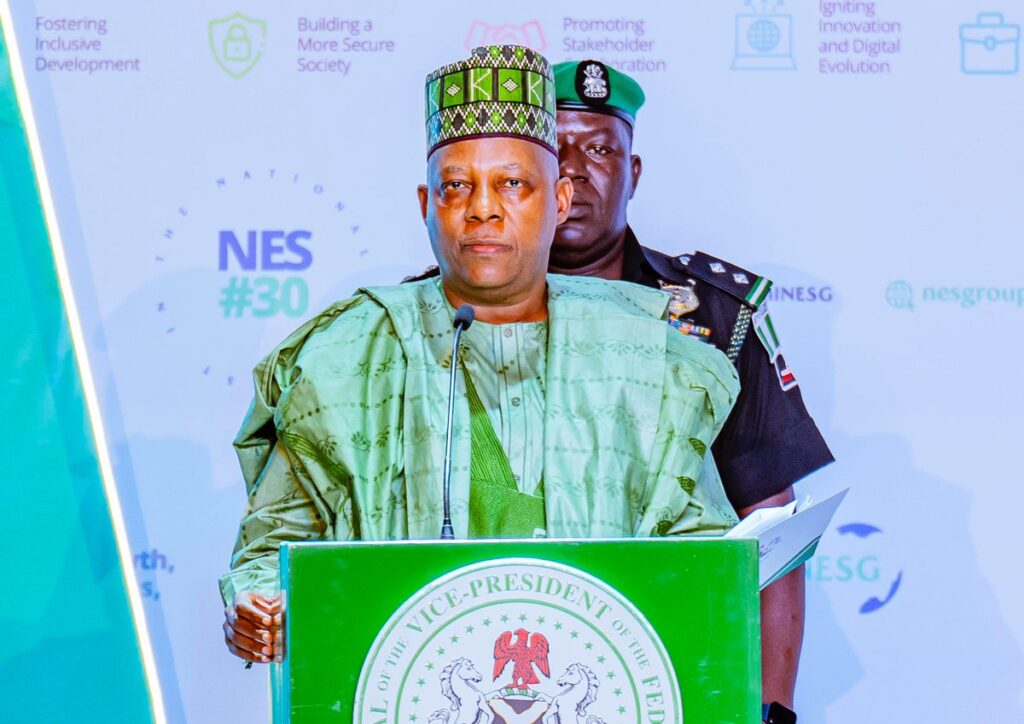President Bola Tinubu has urged for stronger collaboration between government agencies, the private sector, and international partners to drive economic growth, improve competitiveness, and ensure stability in Nigeria.
This call follows encouraging economic indicators, signalling that recent reforms introduced by his administration are starting to show positive outcomes.
Speaking at the 30th Nigerian Economic Summit on Monday, organized by the Nigerian Economic Summit Group in partnership with the Ministry of Budget and Economic Planning, President Tinubu highlighted his administration’s Renewed Hope Agenda.
The agenda is focused on fostering an environment conducive to sustainable economic growth and shared prosperity.
Tinubu stressed the need for Nigeria to prioritize economic diversification, reiterating his administration’s commitment to fostering inclusive and sustainable growth in sectors such as agriculture, manufacturing, and the digital economy.
Speaking on behalf of the President, Vice President Kashim Shettima addressed significant economic challenges, outlining the government’s ongoing initiatives to improve infrastructure, simplify regulations, and enhance the ease of doing business in Nigeria.
“We are currently completing key infrastructure projects such as roads, railways, and power plants that will enhance connectivity and productivity. We are harmonizing regulatory processes to reduce the bureaucratic hurdles that have long stifled entrepreneurship and innovation,” the President noted.
President Tinubu noted the recent economic measures undertaken by his administration, including the removal of the fuel subsidy and the unification of foreign exchange rates.
He described these actions as part of a comprehensive strategy aimed at stabilizing the macroeconomic environment.
“These measures are integral to our broader effort to restore balance to the economy and ensure long-term stability,” he stated.
In addressing the vital issue of economic inclusivity, President Tinubu noted, “Our competitiveness extends beyond improving our position on global indices. It is about creating an inclusive Nigerian economy—one where small and medium-sized enterprises can thrive alongside large corporations and where every citizen, regardless of their location or background, can access economic opportunities.”
He assured the public, “With the right policies, partnerships, and commitment, Nigeria can emerge stronger, more competitive, and more resilient than ever.”
Earlier, the Minister of Budget and Economic Planning, Atiku Bagudu, reinforced the impact of recent government reforms, asserting, “There is substantial evidence that these reforms and investments are yielding positive results.”
“These governance and institutional reforms have helped to improve our macro-economic performance. Our GDP has been enhanced from 2.98 cent growth in the first quarter of 2024 to 3.19% in quarter two of 2024, inflation is trending downwards while external reserves are improving,” he added.
The minister urged the public to support the government’s initiatives, stating, “We seek the cooperation and understanding of all citizens, as there is indeed light at the end of the tunnel.”
Indermit Gill, Senior Vice President and Chief Economist at the World Bank, highlighted Nigeria’s vital role in Africa’s economic landscape. He remarked, “Given its size and significance, Africa goes where Nigeria goes. Africa’s rise is synonymous with Nigeria’s rise.”
However, Gill warned about the effects of inflation on citizens and emphasized the need to uphold recent policy changes. He noted, “The President’s key signature policies—such as the unification of multiple exchange rates and the elimination of the oil subsidy—must be sustained.”
In his welcome address, Niyi Yusuf, Chairman of the Nigerian Economic Summit Group (NESG), called for ongoing efforts to strengthen the economy.
“The task before us is to forge decisive reforms that will drive us out of the economic challenges facing us. Since COVID-19, our economy has shown resilience but still fragile. We must take additional steps to make sure that gains in FDI and foreign exchange markets are not reversed,” Yusuf stated.



